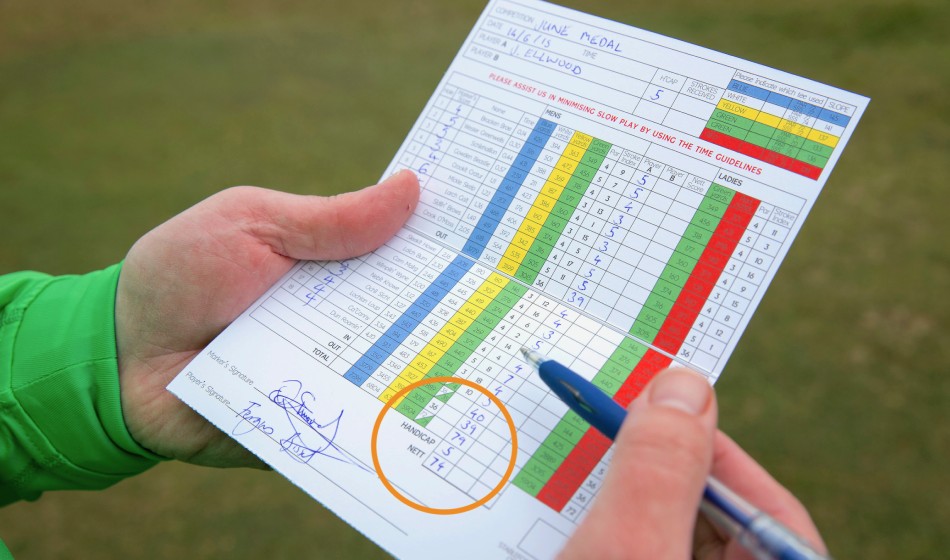
Gross vs Net Golf Score: The way of scoring in golf
17 de February de 2024
Are you passionate about golf and looking to improve your game? Understanding the difference between gross score and net score is key in this sport of precision and strategy. While the gross score reflects the total number of strokes, the net score adjusts the result according to the player’s handicap, offering an equitable perspective for competitors of all levels.
We will break down the peculiarities of each type of score, providing you with a clear understanding that will allow you to both better appreciate professional tournaments and optimize your own strategy on the field. In addition, we will give you practical tips to calculate your net score and use it to your advantage.
Whether you are an amateur golfer or aspire to greatness, understanding these concepts will put you one step ahead in your game. Get ready to dive into the fascinating world of golf scoring, where every stroke counts and every detail can make the difference between a good day on the field and a memorable round.
Introduction to the golf scoring system
Understanding the golf scoring system is essential to fully enjoy the game. Whether you’re starting out or looking to improve your technique, knowing the rules will give you an edge. In this sport, every stroke counts and the way to score can be as strategic as the swing.
The golf uses two main types of scoring: gross score and net score. Both reflect different aspects of your game. The gross score is the total sum of strokes, while the net score adjusts the total according to your skill. It’s like the game itself: simple in concept, but rich in detail.
To calculate your score, you need to know your handicap. This number represents your level of play and is adjusted with each round, allowing players of different levels to compete on equal terms. Thus, golf becomes a game of precision and adaptability.
The scoring system not only measures your performance but also encourages continuous improvement. By comparing your gross and net score, you can identify areas for improvement and set specific goals. With every swing, you’re writing your own story on the golf course.
With this introduction, you’re ready to delve into the details of gross vs net golf score. You’ll learn how each affects your game and how to use them to boost your growth as a golfer. Remember, in golf, as in life, every stroke is an opportunity to surpass oneself.
Key concepts of golf scoring: gross strokes vs. net strokes
Understanding gross strokes and net strokes is fundamental for any golfer. Gross strokes refer to the total number of swings a player makes to complete a round of golf. It’s the most raw and direct figure that reflects your performance on the field.
On the other hand, net strokes are a bit more complex. This figure is obtained after adjusting your gross score with your handicap. The handicap is a system that levels the playing field, allowing golfers of different levels to compete fairly.
In summary:
- Gross strokes: Total number of strokes without adjustments.
- Net strokes: Gross strokes adjusted according to the player’s handicap.
Knowing the difference between these two types of scoring is essential to compete and to understand how your game is scored. Moreover, it allows you to set realistic goals and measure your progress appropriately.
The next time you play, remember to calculate both, and you’ll see how each offers a unique perspective on your game.
Calculating the handicap and its impact on net scoring
Understanding the handicap is essential for calculating your net score in golf. The handicap represents your potential game and is adjusted according to your skill. It’s the tool that levels the playing field among golfers of different levels.
To calculate your handicap, you first need a series of rounds, usually at least five, and the scores must be authorized by a golf club. The best 10 of your last 20 scores are taken into account and a specific formula that considers the difficulty of the course is applied.
Once you have your handicap, the net score is simple to obtain. You just subtract your handicap from your gross score. Thus, if you played 18 holes and your gross score was 90 with a handicap of 15, your net score would be 75.
The impact of the handicap on your games is significant. It allows players of different levels to compete on equal terms. Moreover, your net score will help you measure your improvement in the sport more accurately.
Remember that the handicap is dynamic and updates as you record new rounds. Keeping it up to date is key for fair play and to follow your progress. So keep practicing and recording your scores!
Strategies to improve your score on the field
Improving your score in golf depends not only on your skill but also on strategy. Here we provide you with some practical tips so you can see results in your next game.
Know the field: Before starting, study the field where you are going to play. Familiarize yourself with each hole, the obstacles, and the approach areas. A good strategy begins with knowledge of the terrain.
Manage your equipment: Choosing the right clubs for each situation is crucial. Don’t just go by distance, also consider factors like wind and the type of terrain.
Practice putting: Games are won on the greens. Dedicate time to improving your putting technique. A good putt can save a bad shot and significantly improve your score.
Keep calm: Golf is as mental as it is physical. Learn to manage your emotions and maintain concentration on each stroke. Patience is your best ally on the field.
Plan your shots: Don’t rush. Take a moment to plan your strategy before each stroke. Think about where you want the ball to land and how that will influence your next shot.
With these tips and constant practice, you will notice an improvement in your score. Remember, the key is in preparation and focus. See you on the field!
Understanding the difference between gross score and net score in golf is key to fully enjoying the game and improving your performance. Whether you’re competing in a tournament or just playing a friendly round, knowing how to calculate both scores will help you set clear goals and measure your progress.
Remember that the gross score is your score without adjustments, while the net score considers your handicap to level the playing field. No matter your skill level; both scoring methods are fundamental to the spirit of golf, which celebrates integrity, honor, and continuous improvement.
So the next time you go out to the field, take this knowledge with you. Record your strokes accurately, calculate your net score, and use that information to adjust your strategy and technique. Golf is a journey, and every stroke counts on your path to improvement.
With practice and dedication, you’ll see how your ability to discern between gross and net will help you better understand your games and, most importantly, enjoy every moment on the field. Go out, play, and continue perfecting your golf game!
